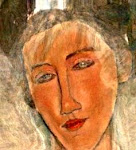I have
little doubt that, had I been born in Prague at the end of the 19th
c., I would have had a serious relationship with Franz Kafka. His writings have
fascinated me since my teens; I greedily read his novels, The Trial and The Castle,
after stumbling upon The Metamorphosis
and becoming addicted to his hallucinating world.
It often
happens to young bookworms to become enamoured with an author; for me, I had
several imaginary lovers among my favourite novelists and poets, the first one of whom
was Catullus, an erotic poet who was fancifully portrayed on the cover of my
Latin anthology at high school. Then I fell for Alain Peyrefitte, Théophile
Gautier, Roland Barthes, Italo Svevo, Bulgakov, Keats, Coleridge, Novalis and
others. Invariably, they were all deceased. Yes, when you adore a literary
work, you long to meet the author. However, you also know that very often the
person behind the work is far from coming close to your expectations. If he’s
passed away, the risk no longer exists and you can let your imagination run
free.
With Kafka,
it’s different. My passion for the person was not immediate. Yes, of course I
was enthralled by his work, but the curiosity about his life came about much,
much later.
The
intensity of the stare caught on camera, that youthful yet ancient small face
hiding many untold secrets, some of which were hinted at in the biography; his
high sex drive, his slight yet sinewy frame, his insecurities and his sense of
humour, his attraction to strong women, all these combined to create what is
currently defined as the “wow factor”, that is an inexplicably powerful sexual
attraction.
The brain
is the most important and most fascinating sex organ, still to be unravelled.
(C) DaniBlue
13th March 2015
(C) DaniBlue
13th March 2015











No comments:
Post a Comment